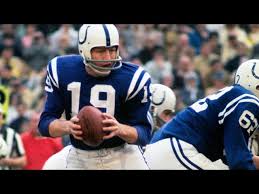In the pantheon of American football legends, few names resonate with the same reverence as Johnny Unitas. Known as “The Golden Arm,” Unitas wasn’t just a great quarterback he was a transformational figure who helped shape the modern NFL. With a career that spanned from 1956 to 1973, Unitas became a symbol of toughness, leadership, and precision, paving the way for future generations of quarterbacks.
From Scrap Heap to Stardom
John Constantine Unitas was born on May 7, 1933, in Pittsburgh, Pennsylvania. His journey to NFL greatness was anything but conventional. After playing college football at the University of Louisville, he was drafted in the 9th round of the 1955 NFL Draft by the Pittsburgh Steelers, only to be cut before the season began.
It seemed like the dream had ended before it even started. But fate and his unrelenting work ethic had other plans. Unitas joined a semi-pro team for $6 a game while working in construction. In 1956, the Baltimore Colts gave him a second chance, and it was a gamble that would change football history.
The Rise of a Legend
Unitas’s rise with the Colts was meteoric. He became the full-time starter in his rookie season, and by 1957 he led the league in touchdown passes. The following year, Unitas guided the Colts to the 1958 NFL Championship, widely regarded as “The Greatest Game Ever Played.”
In that epic clash against the New York Giants, Unitas led a game-tying drive in the final minutes and a game-winning touchdown in sudden-death overtime the first in NFL history. Broadcast nationally, the game put professional football on the map, and Unitas was at its heart: cool, unflappable, and ruthlessly efficient.
Rewriting the Record Books
Unitas was the prototype for the modern quarterback: a field general who combined physical toughness with an unmatched football IQ. His stats were revolutionary for the era:
- 3× NFL MVP (1959, 1964, 1967)
- 10× Pro Bowl selection
- 4× First-team All-Pro
- Led the NFL in passing yards 4 times
- 47 consecutive games with a touchdown pass, a record that stood for over 50 years
His ability to read defenses and call plays from the line of scrimmage made him one of the most cerebral players of his generation. And unlike many of today’s quarterbacks, Unitas often called his own plays—a testament to his deep understanding of the game.
A Toughness That Defined an Era
Johnny Unitas was not a quarterback who relied on flashy plays or natural gifts alone. What separated him was his toughness both mental and physical. He played through injuries, took punishing hits, and never backed down.
Teammates and opponents alike respected his resolve. Ray Nitschke, the legendary Green Bay Packers linebacker, once said, “Unitas was the guy you didn’t want to face in the two-minute drill. You knew he was going to beat you.”
Legacy and Impact
When Unitas retired in 1973, he held virtually every significant passing record in the NFL. But his legacy transcends numbers. He helped elevate the quarterback position to a leadership role, setting a standard for poise under pressure.
In 1979, he was inducted into the Pro Football Hall of Fame, and in 1999, The Sporting News named him the greatest NFL player of all time. His iconic flat-top haircut, high-top cleats, and steely expression remain etched in the collective memory of football fans.
Beyond the field, Unitas remained connected to the game, mentoring young players and advocating for the rights of retired NFL athletes. He passed away in 2002 at age 69, but his impact is still felt throughout the league today.
The Quarterback Who Started It All
Before Tom Brady, Peyton Manning, or Joe Montana, there was Johnny Unitas a player who not only played the position but defined it. He brought a blend of strategy, toughness, and leadership that made football not just a game of brute force, but a battle of minds and wills.
Unitas wasn’t just the face of the Baltimore Colts; he was the face of a league coming into its own.

